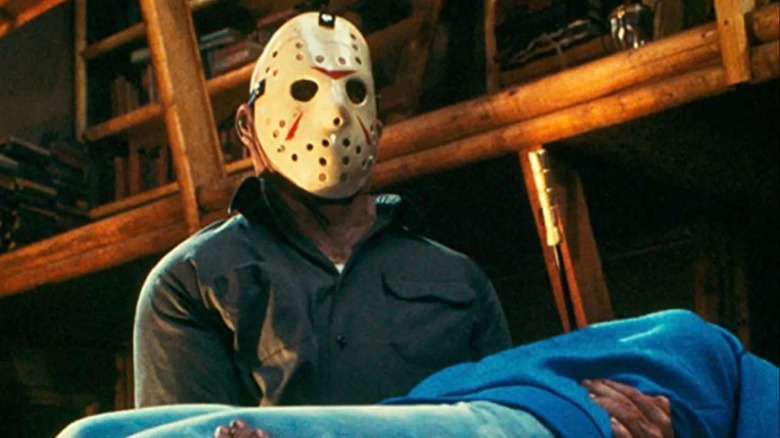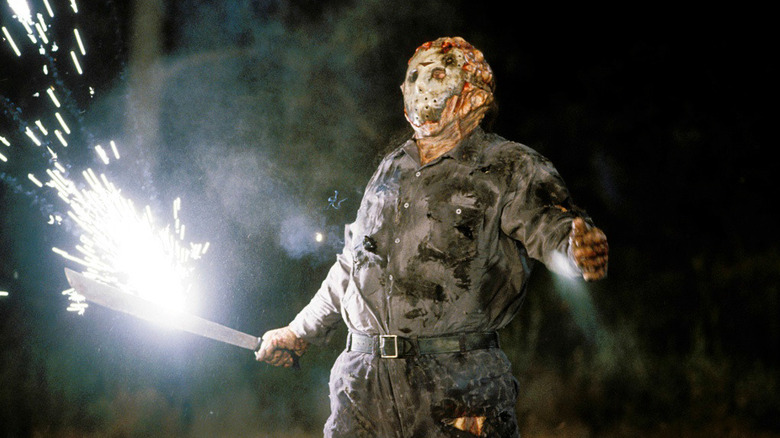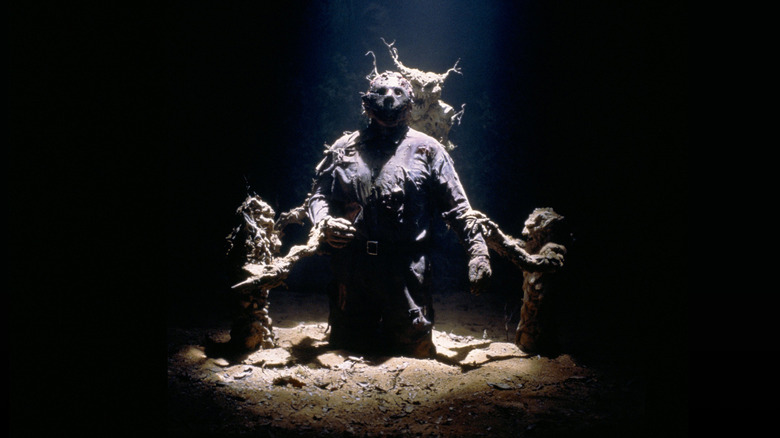Why Jason Voorhees Never Talks In The Friday The 13th Movies
In Sean Cunningham's 1980 slasher "Friday the 13th," Jason Voorhees is little more than the subject of a notorious ghost story. Camp counselors at Camp Crystal Lake, New Jersey, loved to scare young campers by telling them the very true story of the developmentally disadvantaged who wandered off and drowned in the lake decades earlier. It seems that the counselors who were tasked with caring for Jason were too busy copulating to notice he was in danger. Years later, however, counselors are suddenly being systematically murdered by an unseen assailant. Is it Jason returned from the grave, murdering counselors as revenge?
In the first "Friday," it was revealed that Pamela Voorhees (Betsy Palmer), Jason's mother, had snapped and was killing counselors in honor of her dead son. In "Friday the 13th Part 2," however, it was revealed that Jason had been alive all along, and had grown to adulthood living in the woods, unbeknownst to Pamela. When Jason witnessed his mother die during the first "Friday" climax, he elected to continue her legacy of killing any and all camp counselors with the temerity to have sex or take drugs. He proceeded to commit 181 murders throughout 11 sequels and crossover films. Along the way, he accumulated a Detroit Red Wings hockey mask and is now rarely seen without it.
A notable feature of Jason Voorhees, however, is that he never speaks. The character has been played by several actors and stuntmen throughout the history of the franchise — most frequently by Kane Hodder — and none of them has a single line of dialogue. It wouldn't be until the ninth film, "Jason Goes to Hell: The Final Friday," that Jason would be given something to say, and even then it may not count; Jason's spirit was transferred into the bodies of other people, and he used their voices to communicate.
There haven't been any scripted, canonical reasons for Jason's muteness, but some Redditors have theories.
Some theories as to why Jason doesn't speak
The simplest theory for Jason's nonverbal qualities is that he never developed his ability to talk. He is, by the film's own lore, developmentally disadvantaged, and one of the manifestations of his condition is the inability to speak. One Reddit user by the name of PJ-The-Awesome, however, theorized that Jason has instead taken a personal vow of silence. He was abused as a child (according to comics and other expanded universe lore), and when he nearly drowned in Camp Crystal Lake, his cries went unheard. Since his pain was never acknowledged, Jason sees no reason to speak. It's a sound theory.
And Jason can vocalize a little bit. Throughout the series, Jason can be heard occasionally grunting or panting when he gets hurt. The serial killer simply refuses to offer any vocal input into the human world, which he despises. By this theory, there's every reason to believe he talks to himself in private.
But, as mentioned, Jason does vocalize in "Jason Goes to Hell." There is a moment in the film when Jason exits his famed masked body and passes into the body of a cop. For the record, Jason didn't have body-swapping abilities in any of the other "Friday" movies. The heroine of "Goes to Hell," Jessica (Kari Keegan), has a demonic dagger that will be able to kill Jason's spirit once and for all, no matter what body he is inhabiting. To trick Jessica, Jason yells "Freeze! Get the hell away from her, Ed!"
Now, Jason's immortality rules are a little different in "Jason Goes to Hell," and it's easy to imagine that he, while occupying another person's brain, has access to their skills and memories. It's possible that Jason couldn't speak until he transferred into a speaking person. Just as if he occupied the body of a juggler, surely he'd be able to juggle.
Did the makers of Jason Goes to Hell: The Final Friday know they were breaking an unspoken rule?
On the DVD commentary track for "Jason Goes To Hell," director Adam Marcus and screenwriter Dan Lorey talked about how Jason's line of dialogue, even in the body of a cop, is a little strange. They said they debated the scene a little bit, not really sure how Jason would be able to disguise himself from Jessica. Ultimately, they decided that having Jason speak was the best way for the scene to play out, even though it bucked over a decade of tradition.
Of course, because of the body-hopping conceit of "Jason Goes to Hell," there's a lot more that purists can protest than just a line of dialogue. The fact that Jason Voorhees is a demonic creature is a new idea for the series. Jason, of course, seemed incapable of being killed, but a close look over the first eight movies reveals very little in the way of supernatural spells. When Jason is "killed" in "Friday the 13th: The Final Chapter," for instance, the knife doesn't slice all the way into his skull, perhaps leaving him with a wound he could recover from. When he was buried and then exhumed in "Friday the 13th Part VI: Jason Lives," one might recall he was stabbed through the heart with a metal crowbar, only for the crowbar to be struck by lightning. As we all know from "Frankenstein," a lightning bolt can resurrect a dead corpse. That's not magic. That's science.
Same with "Friday the 13th Part VIII: Jason Takes Manhattan." Jason was shocked back to life by an electrical cable. Most of Jason's resurrections can be explained by electricity or a hearty healing factor. "Goes to Hell" is the first time that Jason is depicted as undeniably demonic.
After that, hearing him speak is small potatoes.


